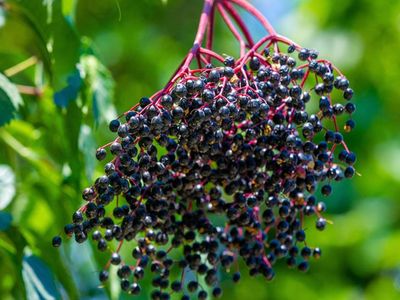10 Advantages of Elderberry (Immune Health, Cardiovascular Benefits, and Beyond)
Elderberries are widely celebrated for their remarkable health benefits, especially in enhancing immune function and promoting heart health. With a long history of medicinal use dating back centuries, these berries have become a popular natural remedy for various health concerns. Should you consider adding elderberries to your wellness routine? Let’s delve into the scientific findings.
What Are Elderberries and Where Do They Originate?
The elderberry, scientifically known as Sambucus nigra, is part of the Adoxaceae family and is native to much of Europe. Commonly referred to as elder, black elder, or European elderberry, it has been valued for its healing properties by indigenous peoples and ancient cultures alike. Historically, elderberries were used to treat fevers, rheumatism, and even enhance skin appearance. Even today, they remain a staple in traditional medicine across many regions. (1)
The Advantages of Elderberry
Elderberries are not just flavorful; they are brimming with essential nutrients. These small fruits are a rich source of vitamin C, dietary fiber, phenolic acids, and anthocyanins, all of which provide strong antioxidant benefits. Like other berries, elderberries are low in calories and high in fiber, offering a powerful nutritional boost to support overall health. (2)
Elderberries contain a wealth of antioxidants, making them effective in combating oxidative stress and neutralizing harmful free radicals. Oxidative stress has been linked to numerous health issues, including cancer and chronic diseases. Anthocyanins, flavonols, and other antioxidants in elderberries help fight inflammation, reduce the risk of illness, and promote cellular health. Research highlights the impressive antioxidant activity of elderberries, making them a valuable addition to a health-conscious diet. (3)
Elderberries have long been used as a remedy for colds and the flu. Scientific studies suggest that the compounds in elderberries can help shorten the duration and severity of influenza. Commercial elderberry products, such as syrups and capsules, have shown promise in reducing symptoms and speeding recovery during respiratory illnesses. (4)
Research indicates that elderberries may contribute to cardiovascular health by lowering blood fat levels and cholesterol. The presence of flavonoids, such as anthocyanins, supports heart function and reduces the risk of heart disease. Including elderberries in your diet could help promote a healthy circulatory system and overall heart wellness. (5)
Elderberries possess natural antimicrobial qualities, making them effective against harmful bacteria and infections. Their bioactive compounds can inhibit the growth of pathogens and enhance the body’s defense mechanisms. Regular consumption of elderberries may help maintain a balanced microbial environment and protect against bacterial infections.
Studies suggest that elderberries may help prevent cancer by inhibiting tumor growth and protecting against DNA damage. The antioxidants in elderberries play a vital role in reducing inflammation and oxidative stress, which are associated with cancer development. Adding elderberries to a diet aimed at cancer prevention could offer additional protective benefits. (6)
The antioxidants found in elderberries may shield the skin from damage caused by UV rays. By minimizing oxidative stress and inflammation induced by sun exposure, elderberries can help reduce the risk of skin aging and sunburn. Incorporating elderberries into your diet or skincare routine may provide extra protection against environmental factors. (7)
Elderberries are well-known for their ability to boost the immune system, making them particularly useful during the cold and flu season. Their high vitamin C content, combined with various antioxidants, strengthens the body’s defenses against infections. Consuming elderberries regularly can enhance immunity and decrease susceptibility to illness. (8)
Preliminary research suggests that elderberries could have mood-enhancing effects and support mental health. The anti-inflammatory and antioxidant properties of elderberries may help reduce oxidative stress in the brain and regulate neurotransmitter activity. Including elderberries in your diet might provide natural support for managing depressive symptoms and promoting emotional balance. (9)
Elderberries are known for their diuretic properties, which help increase urine production and eliminate toxins from the body. This can contribute to improved kidney function, lower blood pressure, and reduced fluid retention. Consuming elderberries in appropriate amounts may aid in maintaining optimal kidney health and fluid balance. (10)
Potential Risks of Consuming Elderberries
Although elderberries offer a host of health benefits, it’s important to be aware of possible risks. Raw elderberries, along with some parts of the plant, contain compounds that can be toxic and cause digestive discomfort. To minimize risks, it’s recommended to consume cooked or processed elderberry products from reliable sources.
How to Incorporate Elderberries
Elderberries are versatile and can be enjoyed in various forms, such as syrups, teas, tinctures, or supplements. One of the most popular methods is to prepare elderberry syrup, which can be added to beverages, desserts, or taken directly. Always ensure that elderberry products are sourced from reputable suppliers, and consult a healthcare provider before use, especially if you are pregnant or have pre-existing health conditions.
Final Thoughts
Elderberries are a natural remedy with a wide range of health benefits, from strengthening immunity to supporting cardiovascular health and offering cancer-fighting potential. By incorporating elderberries into your diet in a safe and measured way, you can take advantage of their powerful properties to enhance overall well-being.




